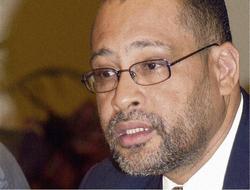Dionne Rose, Business Reporter

Latibeaudiere
Having in the past been unreceptive, or at best lukewarm, to the idea of appearing before any public hearing into the financial sector melt-down of the 1990s, the Bank of Jamaica (BOJ) now says it would testify in an inquiry into the so-called Finsac affair, if required to do so.
Audley Shaw, the finance minister in the Jamaica Labour Party administration which came to office last September, has said he is willing to have an inquiry into the matter - a call that was initially resisted by his predecessor, Dr Omar Davies.
Yesterday, BOJ governor, Derick Latibeaudiere, suggested that past central bank reservations to testifying before proposed hearings had to do with the fact that these would have taken place while litigation was under way against banks it supervised, whose principals had been accused of misconduct that helped to trigger the financial crisis.
"So ... we wouldn't be opposed to testifying at this time," he told the Financial Gleaner. "We can't be, the BOJ is the regulator."
The mid-to-late 1990s financial sector crash is among the most controversial, politically charged and expensive episodes in Jamaica's modern history.
Several banks and insurance companies, which used short-term money to invest in long-term assets, much of it on their own account, went belly up in the face of a credit crunch and the deflation of an asset bubble.
The bailout, mostly through Finsac, a resolution agency set up by the government, cost taxpayers an estimated J$140 billion, and is considered a major cause of Jamaica's current high debt-to-GDP ratio of 118.7 per cent, based on 2006-07 fiscal year estimates. But in the end, many people lost homes and businesses when they could not afford to meet debt payments, inflated by high interest rates.
Apportioning blame for the crisis has, for most of the past decade, been a major issue of discussion and debate, often coloured by political leanings.
Many people place the blame on Davies, who was finance minister for 14 years. They say that the problem was unleashed when he sought to tamely run away with too draconian a squeeze on money supply, which drove up interest rates.
Underestimation
The upshot, this argument goes, was that borrowers defaulted, leaving banks with a mountainous portfolio of non-performing loans that could not be sustained. Davies is also accused of early on, when the situation was salvageable, underestimating the scope of the problem.
However, Davies and his supporters have argued that banks were cavalier in their lending, too often putting cash into their own, sometimes unsound ventures in an attempt to build corporate edifices. They point to the survival of the
foreign-owned banks with more conservative lending practices.

Davies
Early in the decade, the Senate members attempted to have parliamentary hearings into the matter, but the initiative collapsed in part because of the attitude of the BOJ.
At the time, the central bank told a committee that it could not participate because it could not give information it required on the institutions it regulated. It could provide that information to the finance minister.
'Highly improper'
But Latibeaudiere, explaining the BoJ's attitude yesterday, said it would have been "highly improper" if the case was in court, to be appearing before anybody.
"... That would have been the only concern," he said.
A number of entrepreneurs who lost assets during the meltdown recently launched the Association of Finsac'ed Entrepreneurs, hoping to recoup assets, some of it sold by the Government to the Jamaica Redevelopment Foundation (JRF), a company owned by Beale Bank of Texas.
The association is also pushing for the inquiry which has been supported by Shaw.
"We are urging persons, you don't have to be Finsac'ed, who sympathise with the cause or any Jamaican of goodwill who means the country well and who wants us to restore the economy, we are urging them to sign on to help right this great wrong that has been done to the business sector of this country," said Chairman Neville Boxe.
dionne.rose@gleanerjm.com

